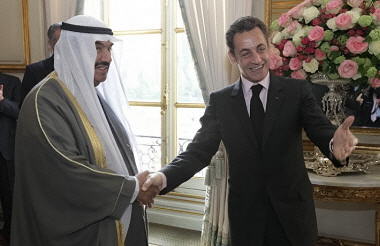Ministers from France and Kuwait have signed a cooperation agreement on the development of peaceful nuclear energy in the middle eastern country, while Saudi Arabia has established a new national agency to take the lead role in its nuclear activities.
 |
| President Sarkozy welcomes Sheikh Nasser Al Mohammed Al Ahmed Al-Sabah to France. (Image: Présidence de la République-P Segrette) |
The Franco-Kuwaiti cooperation agreement was signed in Paris by French secretary of state for cooperation and francophony Alain Joyandet and Kuwait under-secretary for foreign affairs Khalid Sulaiman Al Jarrallah. The agreement will enable the two countries to cooperate across the range of civil nuclear energy applications, including electricity generation, water desalination, research, agronomy, biology, earth sciences and medicine, as well as helping Kuwait to develop its human resources and its spent fuel and waste management.
The bilateral agreement was one of three signed during a state visit by Kuwait's prime minister, Sheikh Nasser Al Mohammed Al Ahmed Al-Sabah, to France. It was described by the French government as a "concrete example" of France's pledge to share its experience with countries wishing to embark on nuclear power programs made at the international conference on access to civil nuclear power held in Paris earlier this year.
Kuwait is one of the six member states of the Gulf Cooperation Council (GCC) that commissioned a study into the peaceful use of atomic energy in December 2006. In March 2009, it announced plans to set up a national nuclear energy commission, in cooperation with the IAEA, and in January this year the French Atomic Energy Commission (CEA) and Kuwaiti Committee for the Peaceful Usage of Atomic Energy signed an agreement on developing nuclear cooperation and exchanging expertise.
Saudi sets up nuclear 'city'
Meanwhile, Saudi Arabia is to establish a centre that will take a major role in its moves to set up a nuclear power program. The centre, called the King Abdullah City for Atomic and Renewable Energy, was established by a royal order issued by King Abdullah bin Abdulaziz on 17 April.
The Riyadh-based 'city' will be tasked with promoting research, making future deals, and overseeing activities related to the use of atomic energy, according to an announcement by the Saudi Arabian government. It will also be the competent agency in charge of fulfilling national requirements in reference to existing and future treaties on nuclear and renewable energy signed by the kingdom, as well as being responsible for supervising works related to nuclear energy and radioactive waste projects.
The initiative will be primarily funded through allocations from the state budget.
Researched and written
by World Nuclear News




_66891.jpg)
_30199.jpg)
_72306.jpg)






